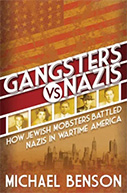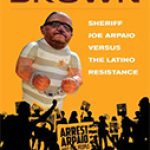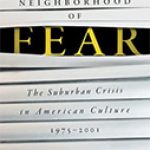Gangsters Vs. Nazis: How Jewish Mobsters Battled Nazis in Wartime America

Author: Michael Benson
Publisher: Kensington Publishing Corp., 2022. 304 pages.
Reviewer: Frederick T. Martens | September 2022
“Once…we have succeeded in undermining the faith of the American people in their government…we will assume power” (p. 168). These words were spoken in 1933 by the leader of the Third Reich. Michael Benson’s kaleidoscope of vignettes provides us with a remarkable journey into the kind of anti-Semitism promoted and enforced by Hitler, as well as into the domestic terrorism in the U.S. that preceded World War II.
As criminologists the world over have shown, when government institutions fail to provide the people, or a sizable segment thereof, with the goods and services they desire, collateral institutions, some illegal, will.
Michael Benson, a renowned organized crime writer in his own right, suggests this constant was alive and well in the 1930s. While Benson may not resort to so much of the academic discourse that characterizes the academic literature on organized crime, Gangsters vs. Nazis is quite worthy of exploration and attribution.
In his quest to regale the exploits of one of America’s most infamous racketeers — Meyer Lansky, Benson approaches lionizing the man and his deeds. He provides a robust and muscular defense of Lansky and his cohort during a dark period in American history.
Robert Rockaway, a noted authority on Lansky, is not quite as generous. As Rockaway points out, “Lansky …. [and other Jewish gangsters] got their start in crime by preying on Jews…. these men were no latter-day Robin Hoods…Yet in their time they contributed to their people’s survival” (Rockaway, pp. 234-235).
According to Benson, “Lansky bore witness to the horrors of rising Nazism in Europe, specifically the burning, raping and looting pogroms that swept through his home village” (p.47). Refusing to accede to the humiliation, degradation, and violence visited upon the Jewish community, Lansky and his criminal colleagues joined in the pledge “never again.” They engaged in selective acts of mayhem and brutality, thus disrupting and undermining the Fascist movement in America.
War with Germany was on the horizon at this time. The neo-Nazi movement in America began to dissipate. Anti-Nazi and indeed anti-German attitudes started to percolate. Lansky and his ally, Charles “Lucky” Luciano, were “invited” to aid the American military by ensuring the security of the New York waterfront, and by providing geographic intelligence for the incursion of the American troops on the shores of Sicily (pp. 251, 264).
Irony is, of course, too often cruel and striking. Both Luciano and Lansky ultimately would be denied residency in the countries they loved—Lansky in Israel and Luciano in the United States. To quote the late anti-Fascist radio personality Walter Winchell, “no good deed goes unpunished” (p. 256).
REFERENCES
Rockaway, Robert A. American Jewish History. Vol. 82. No 1/4 (1994) “Hoodlum Hero: The Jewish Gangster as Defender of His People, 1919-1949.” pp. 215-235.
Frederick T. Martens is retired from the New Jersey State Police as a Detective/Lieutenant and the Pennsylvania Crime Commission as its Executive Director. He is a past president of IASOC.


